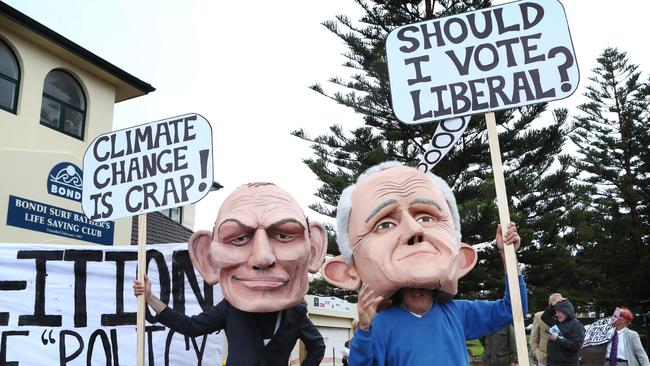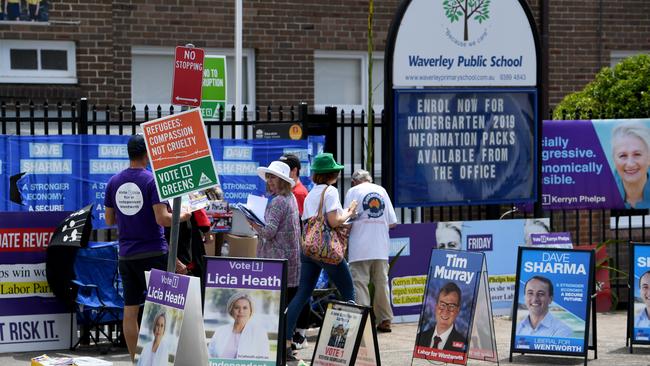Wentworth’s crack of light on climate change

An exit poll at the Wentworth by-election conducted by The Australia Institute indicated that climate change was the biggest single issue behind the swing against the government.
Of 1049 respondents, 78 per cent said it had some influence on their vote, 49 per cent said it had a lot of influence and 33 per cent said it was the main thing.
Later, both the Prime Minister Scott Morrison and Treasurer Josh Frydenberg said the by-election would make no difference to their thinking on climate change.
Maybe it was the second biggest issue, or even the third, after Malcolm Turnbull’s sacking and children on Nauru, but it was certainly an issue, and probably a big one.
Various government ministers and MPs, along with the PM and Treasurer, have said they hear “loud and clear” the message that the people of Wentworth have sent them … just not that one.
The UN Inter-Governmental Panel on Climate Change wouldn’t have helped a fortnight ago with its shocking report entitled “Global Warming of 1.5 °C”, warning of dire consequences if warming is not kept under that, and saying that coal-fired electricity generation had to be cut to zero by 2050.”
The conclusions in the report were supported by more than 6000 research papers and a vast consensus of the world’s scientists.
Mr Morrison immediately dismissed the report, no doubt without reading it, saying that his government’s focus was “to ensure that electricity prices are lower”, something he repeated yesterday. However it rather looks like more than three-quarters of the Wentworth electorate didn’t dismiss the report and have taken issue with the government’s approach.
Three days after the IPCC paper it was reported that the Business Council of Australia’s energy and climate change committee was talking about going it alone with self-regulation of greenhouse gas emissions.
Nothing has happened since then, so maybe the story was wrong, or a beat-up, but in any case the BCA has made it clear that business leaders supported the now-dumped national energy guarantee and still want a clear, sensible national emissions reduction policy.
The breach between conservative politics on one side and science and business on the other – now more than a decade old – is beginning to reach a crisis for the Coalition and for its supporters on this issue in the media and elsewhere.
The problem is that it just won’t go away.
Perhaps the spate of hurricanes, droughts and other extreme weather events, as well as melting sea ice, rising waters and coral reef damage, are caused by something other than anthropogenic global warming, although it would now take a very particular anti-science fervour to think that, but it doesn’t really matter: most people now accept it. The tide has turned, and the supposed “base” of climate sceptics is a clear minority.
In 2000, Al Gore wrote in his book “Earth In The Balance” that: “The minimum that is scientifically necessary (to stop global warming) far exceeds the maximum that is politically feasible.”
But 18 years later those two things may finally be starting to line up.
Meanwhile a few days ago, Liberal Party historian Judith Brett wrote that “climate change denial is preventing the government from developing a coherent economic narrative”.
The problem, as Brett saw it, is that doubting climate change, and believing in coal’s long term future, is an identity issue for Coalition politicians.
The same goes for many in the media, including in this newspaper: disbelieving global warming is a matter of simple differentiation from the “Green-Left” rather than one to which serious thought is applied.
I’m inclined to agree that coming up with a coherent, believable policy for reducing greenhouse gas emissions and, more importantly transitioning Australia away from coal, is now central to having an intelligible economic narrative.
But as the Wentworth by-election showed, there is now more to it than that: it’s now central to having a coherent political narrative as well, and no longer enough to simply repeat over and over that you’re putting lower electricity prices first, as the new energy minister Angus Taylor and the Prime Minister do.

Most people now understand that electricity prices have to do with a lot more than whether it was produced by coal or sunshine and wind, and in particular that high prices probably have more to do with the Coalition’s failure to agree on a coherent emissions reduction policy, that has in turn led to a capital strike and supply shortage.
That’s not to downplay the difficulty and subtleties of the problem. Politics is a game played with clear, simple slogans that usually have to do with money; climate change presents complex moral issues on top of unpalatable financial and economic ones.
This is an unprecedented public debate about arguable apocalyptic predictions far into the future that plays on morality rather than the normal pecuniary preoccupations of politics.
It’s a debate between the industrialised nations that have benefited from cheap fossil fuels and the poorer nations that are most likely to suffer from the global warming that has resulted, and it’s a debate between the (mostly) old living and the young and unborn.
Individually most of us make sacrifices for our grandchildren, but collectively, in game theory terms, there is little incentive for the current generation of humans to lower our standard of living to benefit unborn future ones.
There’s also the matter of Australia’s relative insignificance: no matter what we do, we can’t save the planet by our own actions – it’s simply a matter of joining in, with our feeble contribution to global action.
Kevin Rudd famously said climate change is the “great moral challenge of our time”, before he buckled under the political challenge of it.
Now the IPCC report this month places unprecedented demands on our moral resources, and on our politics.
Before Saturday’s by-election, fatalism and pessimism seemed the most appropriate response. Today, there’s a small crack of light.
Alan Kohler is the publisher of The Constant Investor


